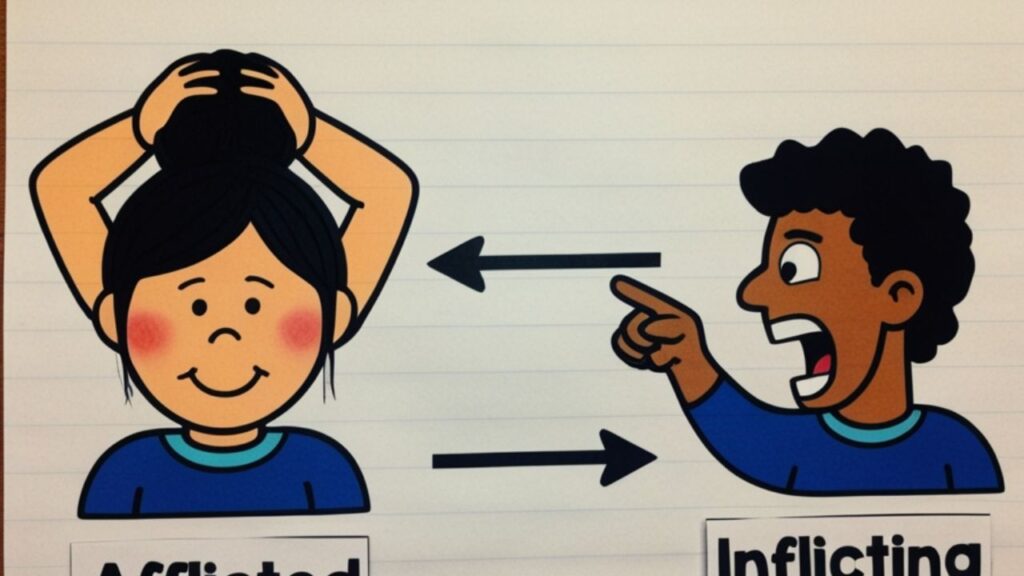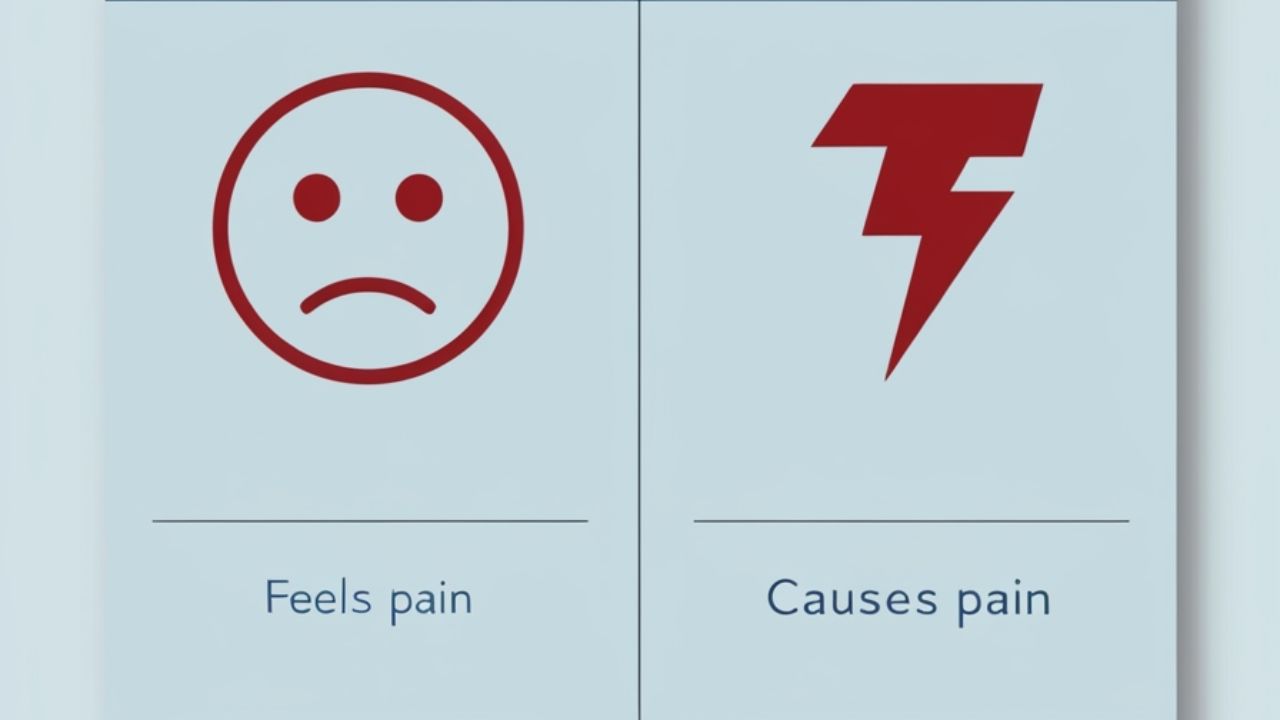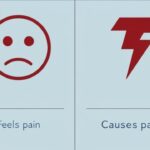Afflict means when someone or something feels pain or suffering. It shows hurt or sadness that happens to a person or group. For example, illness or sorrow can afflict people and make their lives difficult. It’s about feeling the pain inside.
Inflict means when someone causes harm or damage to another. It is an action that gives pain or trouble. For instance, a bully can inflict hurt through unkind words or actions. It always comes from the person who causes the pain.
The main difference between these two words lies in who feels and who causes pain. One word shows the person suffering, while the other shows the person giving harm. Understanding this makes your sentences clear and strong.
Why “Afflict vs. Inflict” Confuses So Many People
Many people mix afflict and inflict because both talk about pain or harm. The words sound similar and come from the same old Latin root. Still, each has its own job in a sentence and shows a different kind of action.
The word afflict tells about someone who suffers, while inflict shows who causes that suffering. This small change makes a big difference. Knowing this helps writers choose the right word and make their ideas clear and correct.
- Similar Sound and Root: Both afflict and inflict come from the same Latin root “fligere,” which means to strike. Their similar sound makes them easy to mix up.
- Both Involve Pain: Each word talks about harm or suffering, but one shows feeling the pain, while the other shows causing it.
- Role Confusion: People often forget who receives and who gives the pain. Afflict shows the person hurt, and inflict shows the one who causes the hurt.
The Root of the Confusion: Understanding “-flict”
- Shared Latin Origin: The ending “-flict” comes from the Latin word fligere, meaning to strike or hit. This shared root connects both afflict and inflict, making them sound and look almost alike.
- Different Beginnings, Different Meanings: The prefixes change the meaning. “Af-” means toward or against, while “in-” means on or upon. These small changes create very different actions.
- Similar Sense of Harm: Both words describe pain or damage, but their direction differs. Afflict shows suffering felt by someone, and inflict shows harm caused by someone.
What Does “Afflict” Really Mean?

Afflict is about experiencing pain or suffering, often as a result of forces beyond your control. It typically appears in medical, emotional, or societal contexts.
Definition:
To cause persistent pain or suffering to; to distress severely.
Examples of Usage:
- Afflict Example: The heavy rain afflicted the small village and made the people struggle for food and shelter.
- Inflict Example: The careless driver inflicted injuries on others by ignoring the traffic rules.
- Afflict and Inflict Together: The long war afflicted families with loss and inflicted pain that lasted for years.
See also Leave It As It Is vs As Is: What’s the Real Difference?
Common Themes:
- Suffering and Pain: Both words often describe situations filled with hurt, sadness, or hardship that people or groups experience in life.
- Cause and Effect: Afflict shows the feeling of pain, while inflict shows the act that brings the pain or damage.
- Human and Social Impact: They appear in stories about illness, poverty, war, or emotional struggle, showing how people face and cause suffering.
Synonyms of “Afflict”
| Word | Context of Use |
| Plague | Often used metaphorically or biblically |
| Torment | Usually mental or emotional suffering |
| Trouble | General term, less intense |
| Oppress | Often used in a political or societal sense |
| Burden | Mental or physical load |
Common Phrases:
- Afflicted with illness: Used when someone suffers from a disease or long-term health problem.
- Inflict pain or harm: Describes when a person causes hurt, injury, or damage to another.
- Afflicted by sorrow: Shows deep emotional suffering or sadness that troubles someone deeply.
Understanding “Inflict” and Its Forceful Tone
Where “afflict” is about receiving suffering, “inflict” is about causing it.
Definition:
Afflict means to cause someone to feel pain or sadness. It shows when a person or group faces trouble or illness. The word helps describe deep suffering that touches the mind, body, or heart in a serious way.
Inflict means to bring pain or harm to another. It shows the act of giving hurt or damage on purpose. The word explains when someone does something cruel or harsh that makes others feel pain or loss.
Examples of Usage:
- Afflict Example: The drought afflicted farmers and destroyed their crops, leaving families without food or income.
- Inflict Example: The storm inflicted serious damage on the small coastal town.
- Afflict and Inflict Together: The disease afflicted many people, while poor medical care inflicted more suffering.
Synonyms of “Inflict”
| Word | Meaning |
| Impose | Usually used in legal or moral contexts |
| Deliver | Can be used metaphorically (e.g., blow) |
| Administer | Often used for punishment or medicine |
| Wreak | Often seen in phrases like “wreak havoc” |
| Deal | Used in phrases like “deal a blow” |
Common Phrases:
- Afflicted with pain or illness: Used when describing someone who suffers from a sickness or hardship that causes long-term trouble.
- Inflict damage or harm: Shows when someone or something brings pain, injury, or loss to another.
- Afflicted by grief or sorrow: Describes deep emotional hurt or sadness that weighs heavily on a person’s heart.
Afflict vs. Inflict: Core Differences Simplified
| Feature | Afflict | Inflict |
| Nature of Action | Passive (experienced) | Active (caused or done) |
| Direction | Suffering received | Pain or damage imposed |
| Common Subjects | Disease, guilt, sorrow | Person, law, force |
| Voice | Often passive | Usually active |
| Context | Medical, emotional, societal | War, law, punishment |
| Sample Use | “She was afflicted with grief.” | “He inflicted grief on her.” |
How Passive Voice Affects Their Use
- Afflict in Passive Form: Writers often use afflict in passive voice because it focuses on the person suffering, like “She was afflicted by fever,” showing the feeling of pain or hardship.
- Inflict in Active Form: Inflict usually appears in active voice since it highlights the doer of harm, such as “He inflicted pain on others,” showing direct action.
- Effect on Clarity: Using active voice makes sentences stronger and clearer, while passive voice shifts focus to the suffering or result instead of the person causing it.
Emotional vs. Physical Harm: A Key Contextual Difference
| Type of Harm | Afflict Example | Inflict Example |
| Emotional | “He was afflicted by guilt.” | “She inflicted emotional abuse.” |
| Physical | “She was afflicted with a chronic illness.” | “They inflicted bodily harm.” |
| Social/Political | “The nation was afflicted by inequality.” | “The regime inflicted censorship.” |
Real-World Examples of “Afflict” in Context
Medicine:
“Over 38 million people are afflicted with HIV globally.” (Source: UNAIDS)
Mental Health:
“Depression continues to afflict millions, especially post-pandemic.”
See also Fish Don’t Fry in the Kitchen: Meaning & Origin
Environment:
- Afflicted by pollution: Many cities are afflicted by dirty air, which harms people’s health and nature’s balance.
- Inflicted damage by humans: Factories and careless waste often inflict harm on forests, rivers, and animals.
- Afflicted by climate change: Rising heat and strong storms afflict communities, making life harder for both people and wildlife.
Real-World Examples of “Inflict” in Action

War and Politics:
- Afflicted by war: Many innocent people are afflicted by battles that destroy homes and separate families, leaving deep emotional scars that last for years.
- Inflicted pain through power: Cruel leaders often inflict suffering on citizens by using unfair rules and harsh punishments.
- Afflicted nations in conflict: Countries torn by violence are afflicted with hunger, fear, and loss, struggling to rebuild peace and hope.
Law and Justice:
- Inflicted punishment by courts: Judges inflict legal penalties on those who break the law to keep order and fairness in society.
- Afflicted victims of crime: People harmed by theft or violence are afflicted with fear, pain, and emotional distress.
- Inflicted justice through action: Law officers inflict justice by arresting criminals and ensuring that fairness protects innocent lives.
Domestic and Personal Conflicts:
- Afflicted by emotional pain: Families are often afflicted by sadness or stress when disagreements grow and kindness fades in the home.
- Inflicted hurt through words: Angry speech or harsh behavior can inflict deep emotional wounds that take time to heal.
- Afflicted relationships: When trust is broken, both sides become afflicted with guilt, regret, and loneliness that weaken family and personal bonds.
Common Mistakes: How Writers Get It Wrong
Writers often swap these words because they both involve pain. But remember: the difference is all about agency.
Incorrect vs. Correct Usage Table
| Incorrect Sentence | Why It’s Wrong | Correct Sentence |
| “The disease inflicted the population.” | Disease doesn’t inflict – it afflicts | “The disease afflicted the population.” |
| “He afflicted pain on others.” | People don’t afflict pain – they inflict | “He inflicted pain on others.” |
| “She was inflicted with sorrow.” | Sorrow doesn’t get inflicted on you | “She was afflicted with sorrow.” |
| “He was afflicted punishment.” | Punishment is inflicted, not afflicted | “He was inflicted with punishment.” (Better: “They inflicted punishment on him.”) |
Tips to Never Mix Up “Afflict” and “Inflict” Again
- Remember the action: Afflict shows when someone suffers, while inflict shows when someone causes that suffering. Think—who feels pain, and who gives it.
- Use a memory link: Connect the words — Afflicted = Affected, Inflicted = Initiated. This helps recall their correct use.
- Practice with examples: Write short sentences using both words daily. Repetition builds confidence and keeps the meanings clear.
Final Thoughts
Understanding afflict and inflict helps people use words more clearly. Each one shows a different side of pain or harm. Learning the difference builds stronger writing and helps ideas sound correct and easy for everyone to understand.
Writers improve when they know how these words work. The meaning becomes clear, and sentences sound more natural. Good use of afflict and inflict makes stories, essays, and lessons smoother and more powerful to read.
FAQs
Is it self-inflicted or self-afflicted?
The correct term is “self-inflicted,” meaning something you cause to yourself, usually pain or harm.
What does “to afflict” mean?
“To afflict” means to cause pain, suffering, or distress to someone.
What is the difference between afflicted and affected?
“Afflicted” means suffering from something; “affected” means influenced or changed by something.
What does it mean to inflict something?
It means to cause or impose something unpleasant, such as pain, damage, or punishment.

Join Bibcia on a journey to master English grammar. Discover easy lessons, writing tips, and practical examples designed to make learning grammar simple and effective.










